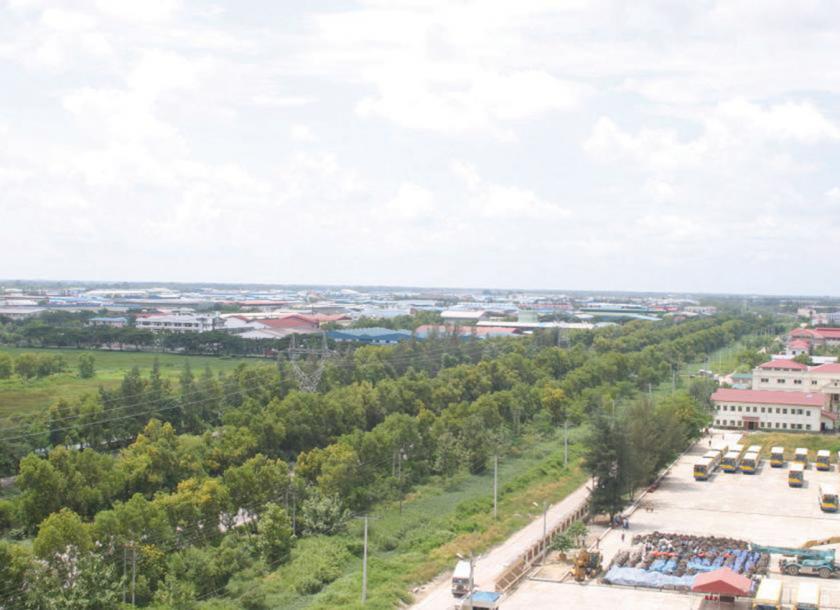Yangon Regional Government will form one centralised supervisory committee for all the industrial zones instead of continuing with one committee for each zone
21 May 2018
The Yangon Regional Government is taking steps to form a central supervisory committee to oversee the development of Yangon’s industrial zones, moving from the current supervisory structure of having one committee for each zone. The move comes on the back of a slew of new industrial projects announced by the government this year.
“We will restructure the current industrial zone committee set up and focus on forming one centralised supervisory committee for all the industrial zones. The restructuring process will begin as a test project at South Dagon industrial zone,” said Daw Nilar Kyaw, Minister of Electricity, Industry and Transport and Communication in Yangon, in parliament Wednesday.
Daw Nilar Kyaw was responding to questions raised on the structure of the committees by U Kyaw Kyaw Maung, MP from East Dagon Myothit Township.
Developed in the 1990’s, the objective of having an industrial zone is to provide firms such as manufacturers with better access to infrastructure and electricity. There are currently 29 industrial zones in Yangon. However, there are no official regulations governing such zones. Each industrial zone is governed by its own supervisory committee so rules and standards differ across each zone.
The Yangon Regional Government is taking steps to form a central supervisory committee to oversee the development of Yangon’s industrial zones, moving from the current supervisory structure of having one committee for each zone. The move comes on the back of a slew of new industrial projects announced by the government this year.
“We will restructure the current industrial zone committee set up and focus on forming one centralised supervisory committee for all the industrial zones. The restructuring process will begin as a test project at South Dagon industrial zone,” said Daw Nilar Kyaw, Minister of Electricity, Industry and Transport and Communication in Yangon, in parliament Wednesday.
Daw Nilar Kyaw was responding to questions raised on the structure of the committees by U Kyaw Kyaw Maung, MP from East Dagon Myothit Township.
Developed in the 1990’s, the objective of having an industrial zone is to provide firms such as manufacturers with better access to infrastructure and electricity. There are currently 29 industrial zones in Yangon. However, there are no official regulations governing such zones. Each industrial zone is governed by its own supervisory committee so rules and standards differ across each zone.
In East Dagon industrial zone, which spans over 800 acres, there are 361 plants and over 23,000 employees but only five committee members to oversee its development. “Five committee members to oversee 23,000 workers is far too few,” said U Kyaw Kyaw Maung.
As a result, many of the zones are poorly managed and unproductive. Meanwhile, access to water, electricity and waste disposal services is either lacking or inefficient.
It is also not uncommon for owners to sell plots of land within the zones. “Some owners purchase the land to speculate on price and not for business purposes. This has deterred genuine investors from buying the land, as prices are sometimes too high.
We will now form a central supervisory committee to standardise regulations and improve infrastructure and productivity across all the industrial zones,” said Daw Nilar Kyaw.
Mounting concerns
Concerns over the management of these industrial zones are mounting at a time when the regional government is rolling out a slew of new industrial projects as part of its New City project.
“The government has said that it wants to develop international-standard industrial zones because the existing zones lack infrastructure. But if the existing industrial zones can be managed and made to carry out their functions, there is no need to construct new industrial zones,” said Daw Kyi Pyar, MP from Kyauktada township.
U Win Maung, MP from Hlaing Thar Yar township, said the issue is not the lack of international-standard industrial zones, but the lack of legislation. “There is currently no centralised system or law to govern the management of these industrial zones. As a result, many are poorly managed and the government has not taken responsibility for this,” he said.
Without official legislation to govern the development of industrial zones, it will also be difficult to attract international investors, said an officer at Shwe Lin Pan industrial zone, who asked not to be named.
“We have been implementing new industrial zones for the past 30 years. Yet, we have not been able to produce high quality Made in Myanmar brands. This is because there is no procedure or law,” the officer said.
(The Myanmar Times: https://www.mmtimes.com/news/yangon-reform-supervisory-structure-industrial-zones-concerns-mount.html )











